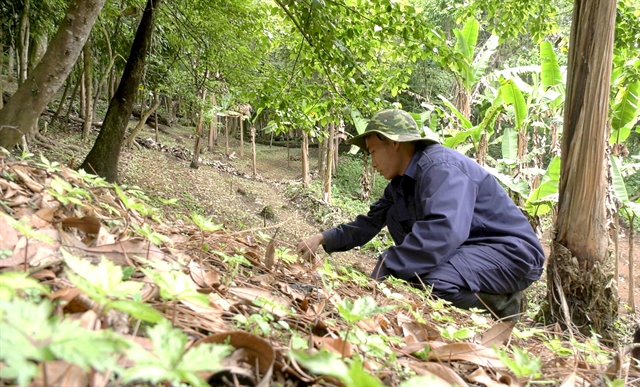 Society
Society

 |
| Growing medicinal plants under the forest canopy helps bring jobs for local labourers in Nghệ An Province. — VNA/VNS Photo Văn Tý |
NGHỆ AN — The central province of Nghệ An has nearly 1,000 species of medicinal plants, many of which are rare and valuable medicinal plants. Along with local government support policies and the investment of businesses, medicinal plants are gradually finding a place in the local plant structure for poverty eradication.
With a passion and desire to turn medicinal plants into crops to help local people alleviate hunger and reduce poverty, Phan Xuân Diện, who was deputy head of the agriculture department of Con Cuông District, decided to quit his job to spend all his time on the development of medicinal plants.
From the initial model of the pilot plant of cà gai leo and thìa canh (scientific name Solanum trilobatum and Gymnema sylvestre), until now, Diện’s Pù Mát Medicinal Materials Joint Stock Company has expanded the area of medicinal plants to four hectares.
Compared with other crops such as sugarcane or corn, the medicinal plants help farmers earn more, up to VNĐ120 million (US$5,100) per hectare per year.
Diện said that while working in the agriculture department, he was assigned to be in charge of the project of growing medicinal plants in the district.
Thanks to that, he knew that the climatic and soil conditions in the western areas of Nghệ An Province were very suitable for medicinal plants.
However, the difficult thing was the market of the plants.
In 2016, he decided to quit his job in the department and set up his own company to grow medicinal plants.
With tireless efforts, he has successfully developed seven products with four and five-star Once Commune, One Product (OCOP) standards in the form of tea, powder, and paste.
His products are sold in many provinces nationwide and exported through e-commerce platforms.
Along with the trend of using medicinal herbs from nature, local people and a number of businesses started planting medicinal plants under the forest canopy which initially brought positive effects and created jobs for local workers.
Lầu Bá Trong in Na Ngoi Commune said that in previous years, he had to work in other northern provinces because he could not find job in his hometown.
“Every month, I earned only VNĐ6-7 million (US$255-300). Accounting for travel and accommodation expenses, the remaining amount was very small,” Trong said.
Last year, when the COVID-19 pandemic broke out, the company he worked for fell into difficulty and he lost his job so he was forced to return to his hometown.
Fortunately, early this year, he found a job at Mường Lống Medicinal Materials Company in his commune with a monthly salary of VNĐ8 million ($340).
Working in his hometown with a stable income helps him reduce expenses and save money.
Thò Bá Rê, deputy chairman of Kỳ Sơn District, said Kỳ Sơn is a border mountainous district with a year-round cool climate in many communes, such as Na Ngoi, Mường Lống and Tây Sơn. Such a climate is suitable for medicinal plants.
In fact, in recent years, the local people have grown medicinal plants such as Giảo Cổ Lam (Jiaogulan) Sâm Thất Diệp Nhất Chi Hoa (Paris polyphilla) Sâm Ngọc Linh (panax vietnamensis), Hylamlayan gingseng and đẳng sâm (Codonopsis pilosula) that brought positive results, but on a small scale.
"Growing medicinal plants under the forest canopy not only helps people have more income but also deters locals from burning forests for farming," Rê said.
Currently, a number of big enterprises have invested in pilot projects with positive results, which can be replicated in the future, such as the model of growing medicinal herbs of Mường Lống Pharmaceutical Joint Stock Company in Na Ngoi Commune.
In order to turn difficulties into advantages, the People's Council of Kỳ Sơn District has issued a resolution to develop the model of growing medicinal plants under the forest canopy.
The cultivation of medicinal plants not only contributes to the conservation of precious genetic resources, but also helps local people change their old production practices and have a new direction in hunger eradication and poverty alleviation.
However, the development of medicinal plants in Nghệ An Province is still underdeveloped.
According to Trần Quốc Thành, director of the provincial Science and Technology Department, in order to develop medicinal plant growing, it is necessary to conserve nature by developing medicinal herbs growing under the forest canopy.
“This helps create livelihoods, increase income for local people, especially ethnic minorities, encourage people to protect forests and create favourable conditions to attract businesses to invest in this field as well,” Thành said.
As part of the master plan on development of medicinal plants to 2020, with a vision to 2030 approved by the Prime Minister, Nghệ An strives to develop stably by 2030 with nearly 18,000 hectares of medicinal plants.
"To achieve this goal, the local authority also needs to have more practical support policies, especially to promote the linkage of the four partners of State, scientists, entrepreneurs and farmers," Thành said.
In particular, enterprises must play a key role in forming a closed chain from care, preservation, processing and marketing, he added. — VNS




